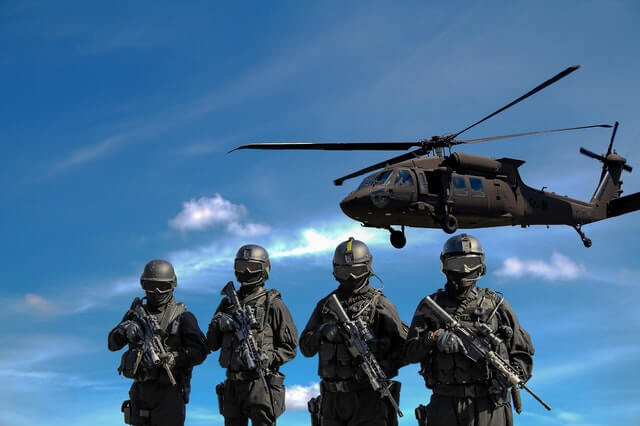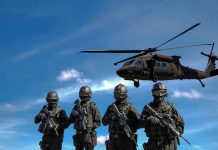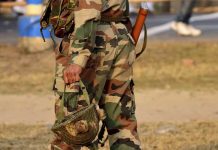This article has been written by Shoronya Banerjee from Amity University, Kolkata. This article provides an overview of certain important provisions of the Border Security Force Act, 1968.
Table of Contents
Introduction
The independence of India had not only set India free from colonial dominance but also vested the nation with the responsibility of protecting each and every corner and border of the nation from further invasions. Right after the independence local police and state administering authorities were endowed with the charge of protecting the borders of the country from enemies trying to penetrate through borders of the nation.
The local forces had faced some of the worst blows and challenges over the years beginning with the attacks in Jammu and Kashmir in 1948, the Chinese attacks in the northern frontiers in 1962, and so on. Each border state of India was responsible for protecting the respective international boundaries, but after 1965 the nation felt the extensive need of developing a stronger and multi-faceted force that would function under the vigilance of the Central Government to strengthen the defense system of the nation.
The Border Security Force (BSF) became operative from December 1965 for protecting the Indian borders, controlling matters, and averting cross-border crimes related to it. It works under the superintendence of the Ministry of Home Affairs which had Mr. K F Rustamji, as its first Director-General of BSF. The Border Security Force Act was enacted in 1968 to provide governance for the regulation of the Armed security forces under the Union Government of India. This Act helps to guarantee the security and safety of the borders of the nation further.
The Border Security Force Act,1968
The Central Reserve Police Force Act 1948 was the initial Act under which the Border Security Force had been established. In 1968, understanding the requirement of a proper and specific set of laws and rules governing the Border Security Force was passed by the parliament. The B.S.F. Bill was presented in the Lok Sabha in 1968 with the objective to institutionalise and lay regulation terms for the armed forces under the Central Government for protecting the borders of India. The Bill had proposed to vest the BSF with duties of safeguarding the India-Pakistan international border, protecting people living in such areas, and preventing crimes across borders like smuggling, trafficking, invasion or exit from the country, and so on.
The Bill took into consideration two aspects, firstly, a question was raised about the nature of the force with its powers of police as well as an armed force. A confusion arose about the role of the BSF that if it was only a border security force or it had some role to play in the internal security system as well. This Force was presented as a paramilitary body with the ability and expertise to match police as well as an armed force. The second aspect dealt with the BSF being used for enforcing law and order and also in the internal security operations. The BSF was established under Article 355 of the Indian Constitution with it being similar to that of any armed forces under the control of the Central Government.
Important provisions
The BSF has played diverse roles over the years, which includes safeguarding the borders and protecting the people inhabiting the areas near it, preventing cross-border smuggling activities, defending the borders from enemy troop invasion, and so on. But the BSF functions under the governance of the Border Security Force Act, 1968. It functions as per the provisions and limitations put forth by this Act. Some of its important provisions are:
Constitution of the force and requirements for the service
- Section 4 of the Act notifies the existence of an armed force under the Union Government of India called the Border Security Force, established to safeguard the borders of India. Every member of this force has to serve in any part of India or even outside India as put forth by Section 7 of the Act.
- Usually, the control of the force is vested in the Central Government of India. The supervision of the force is vested in an officer so appointed by the Central Government, like the Director-General of the Force. This supervisor of the force can be aided and helped by a number of officials as per Section 5(2). Officers like the Deputy Inspectors-General, Commandants, and so on.
- Every officer under the governance of the Act holds office during the pleasure of the President. According to Section 8, no officer of the force can resign during his service and time of engagement. Similarly, no officer can even withdraw himself from his work and duties unless he gets permission in writing from the authorities. Also under this Act, the Central Government has complete authority of removing someone from office.
- Under Section 11 of the Act, the Director-General or any Inspector-General has the authority to dismiss someone from the office or even place a particular person at a lower rank. No officer below the rank of Deputy Inspector-General can remove an officer from service under his command besides a prescribed officer or a subordinate officer.
In the case of Gouranga Chakraborty vs State Of Tripura And Anr, the appellant was a constable in the BSF, since 1966. In 1971 he had received a sanctioned leave as his father had passed away. The Shrad ceremony was taking some time during which he had also fallen sick for which his leave had to be extended with the support of a medical certificate. Soon in December 1971, his Commandant had sent a message addressing his extension of leave which was not notified, and thereafter, he would be dismissed from the service. He had also been asked to submit an explanation and his defense against this step. In response to this, the appellant had a telegram on 21st December 1971 but without the explanation. He received the confirmation of his dismissal soon.
The appellant had filed a civil suit declaring the step of dismissal to be illegal. But it was held that the power vested in the Commandant under Section 11(2) for which he could dismiss officers read along with Rule 177 of the BSF Rules is independent and it was proved that the charge wasn’t illegal. The principle of natural justice had not been violated as held by the High Court and the appeal was dismissed.
Offenses and penalties
- Under Section 14 of the Act if a person commits offences such as abandoning a guard post whose duty was on him, passing on intelligence data, supplies and supports enemies with weapons, equipment, or whatever help required, protects the enemy, and so on. Then that officer is convicted by the Security Force Court, punished with death or any other prescribed punishment.
- A person who has been taken prisoner for disobeying orders, communicates information or intelligence data, and so on cannot be punished with death but imprisonment for a term of 14 years or a lesser term as prescribed.
- If a person is convicted of committing an offense under Section 16 such as gets intoxicated while in service at a post, leaves patrolling without permission, creates an unreasonable alarm, passes the information on a guard, or countersign to someone who is not authorized to receive such information, and so on, then if an officer has committed such an offense while on duty then he shall be punished with an imprisonment term extending to fourteen years or maybe a less severe punishment as prescribed. While on the other hand dealing with an officer, not on active duty, he shall be punished with an imprisonment term extending to seven years or another prescribed punishment.
- In the case of Rakesh Kumar Singh vs Union Of India & Anr, the petitioner, a constable in the BSF had been found asleep during the time of his duty for which he was tried in Summary Security Force Court and was found guilty under Section 16(c) of the Border Security Force Act, 1968 and subsequently discharged of duty. But the first proceeding in the Summary Security Force Court was not completely as per set regulations for which he was again reappointed to service. He was once again dismissed in 2001 for misconduct which was the same charge as the earlier one. This case had ended with the court upholding that the petitioner had to be rehired with full back wages, salary, increments, and so on.
- As per Section 21 of the Act when an officer willfully defies the legal orders or commands of a senior officer, on conviction he shall be punished with an imprisonment term extending to fourteen years or another punishment as laid by the Act. But if that person is not on active duty then on conviction he has to be punished with an imprisonment term extending to ‘ five years or such less punishment.’
- Any person who is under the governance of this act is found to be intoxicated whether on or off duty then on the conviction that person is liable to be punished with imprisonment for a term of 6 months or a lesser time period as prescribed under Section 26 of the Act.
Security Force Courts
- Section 64 of the Act puts forth three categories of security force courts, General Security Force Courts, Petty Security Force Courts, and Summary Security Force Courts.
- A General Security Force Court is organized and assembled under the Central Government, Director-General, or any other such authorized officials who are empowered by a warrant issued by the Director-General. The category of Petty Security Force Courts can be convened by officials who have the authority of convening a General Security Force Court. Section 67 lays that a warrant under the previous Sections 65 and 66 contains restrictions, reservations, and conditions as per the officer issuing it.
- The powers of a General Security Force Court are laid under Section 72 of the Act. It gives the power to the court for trying any person under this Act and for any offense punishable under it. Further under Section 73 the Petty Security Force Courts can try any person under this Act besides officers and subordinate officers for offenses that are punishable under this Act and pass a sentence accordingly but not a life sentence or imprisonment exceeding a term of two years. Under Section 74(2) if there is no important reason for immediate action and the information can reach the officer authorized to convene a Petty Security Force Court for trying the supposed offender, an officer of the Summary Security Force Court shall not proceed without this reference of an offense punishable under Sections 14, 17 and 46 of this Act, or noted offense against such officer
- Section 75 of the Act when a person was charged for an offence and either convicted or acquitted of it by a Security Force Court or by a criminal court or handled under Section 53 or Section 55, he cannot be tried again for the same offence by a Security Force Court, or by a criminal court.
In the case of Rajvir Singh vs Union Of India And Ors, the applicant Rajvir Singh had filed a petition to quash the charges against him of having accepted 3 lakh rupees from Shri Mehrajuddin Ahanga while performing his duties as a monetary gratification for exercising his official powers in Shri Ahanga’s favour and releasing Shri Nazir Ahmed Soli, chief of A1- Jehad outfit, from the BSF’s custody, for which he was also charged under Section 40 of the Act.
The appellant had also tried showing that the General Security Force Court hadn’t been accurately convened as the Inspector General, Border Security Force, who had convened it wasn’t authorized to do so. The violation of Section 65 of the Border Security Force Act, 1968 was highlighted by the appellant. But it was found by the learned Single judge that all rules and regulations had been followed during organizing and holding the trial under the Border Security Force Act and Rules as prescribed. He also put forth that the evidence on records was enough to convict the appellant. The appeal of the appellant had been dismissed by all means.
Conclusion
Hence, the Border Security Force integrates and organizes the functioning of various law enforcement agencies involved in preventing cross-border crimes or crimes committed near the border areas, or defending the Indo-Pakistan and Indo-Bangladesh borders, and protecting the people living in border areas, and also taking care of incidents of encroachments, illegal invasions, and smuggling in such border areas.
Even though the BSF was created and established without understanding its wide and extensive importance, this security force had guarded the borders of the nation at the time of peace talks when there were no border threats at places where borders were specified and legally well marked. With years and time, the aspect of border security has posed a great challenge in front of India. The neighborhood countries have time and again tested the limits of it which further has worsened the border security conditions. Although the BSF has taken these challenges to improve upon strength, members, arms and ammunition, and so on. But with time the BSF and internal security system has had a confusing relationship with the BSF being summoned often to work on internal security issues not considering the effect of such a role reversal.
Under the Congress government the Border Security Force Amendment Bill, 2011 had been introduced in the Rajya Sabha in 2011 by the Minister of State for Home Affairs. The Bill proposed to broaden the area for the affairs of the BSF, it could be anyplace inside the territory of India. This had been immediately opposed by the then Chief Minister of Gujarat, Narendra Modi. For him giving the paramilitary force unconditional power was the Centre’s trial at creating a ‘state within a state.’ This Bill was eventually withdrawn in 2015 after facing a lot of criticisms and opposition for it aimed at giving the BSF limitless powers and going against the federal structure of the government.
References
- https://shodhganga.inflibnet.ac.in/bitstream/10603/19032/7/07_chapter%202.pdf
- https://www.prsindia.org/billtrack/the-border-security-force-amendment-bill-2011-1913
- https://indianexpress.com/article/india/politics/to-amend-bsf-act-centre-to-drop-upa-bill-bring-its-own/
Students of Lawsikho courses regularly produce writing assignments and work on practical exercises as a part of their coursework and develop themselves in real-life practical skill.
LawSikho has created a telegram group for exchanging legal knowledge, referrals and various opportunities. You can click on this link and join:
 Serato DJ Crack 2025Serato DJ PRO Crack
Serato DJ Crack 2025Serato DJ PRO Crack











 Allow notifications
Allow notifications


